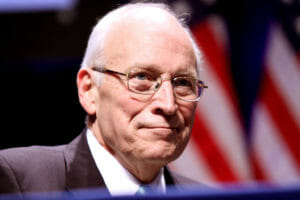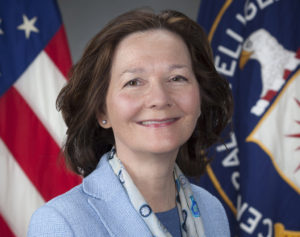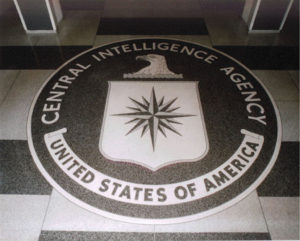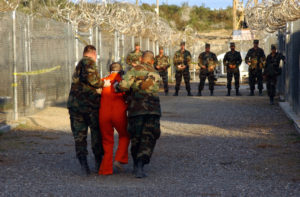Exhibit One in Any Future American War Crimes Trial
Even if the accusations against Abu Zubaydah had been true, what the CIA did to him—with the knowledge and approval of the highest government officials—is a prime example of the kind of still-unpunished crimes that officials such as Dick Cheney, George Bush and Donald Rumsfeld committed in the so-called global war on terror. A portrait of Donald Rumsfeld, the first secretary of defense under President George W. Bush. (thierry ehrmann / CC-BY-2.0)
1
2
3
A portrait of Donald Rumsfeld, the first secretary of defense under President George W. Bush. (thierry ehrmann / CC-BY-2.0)
1
2
3
It was with Zubaydah that the CIA also began its post-9/11 practice of hiding detainees from the International Committee of the Red Cross by transferring them to its “black sites,” the secret prisons it was setting up in countries with complacent or complicit regimes around the world. Such unacknowledged detainees came to be known as “ghost prisoners,” because they had no official existence. As the Senate torture report noted, “In part to avoid declaring Abu Zubaydah to the International Committee of the Red Cross, which would be required if he were detained at a U.S. military base, the CIA decided to seek authorization to clandestinely detain Abu Zubaydah at a facility in Country _______ [now known to have been Thailand].”
Tortured and Circular Reasoning
As British investigative journalist Andy Worthington reported in 2009, the Bush administration used Abu Zubaydah’s “interrogation” results to help justify the greatest crime of that administration, the unprovoked, illegal invasion of Iraq. Officials leaked to the media that he had confessed to knowing about a secret agreement involving Osama bin Laden, Abu Musab al-Zarqawi (who later led al-Qaeda in Iraq), and Iraqi autocrat Saddam Hussein to work together “to destabilize the autonomous Kurdish region in northern Iraq.” Of course, it was all lies. Zubaydah couldn’t have known about such an arrangement, first because it was, as Worthington says, “absurd,” and second, because Zubaydah was not a member of al-Qaeda at all.
In fact, the evidence that Zubaydah had anything to do with al-Qaeda was beyond circumstantial — it was entirely circular. The administration’s reasoning went something like this: Zubaydah, a “senior al-Qaeda lieutenant,” ran the Khaldan camp in Afghanistan; therefore, Khaldan was an al-Qaeda camp; if Khaldan was an al Qaeda camp, then Zubaydah must have been a senior al Qaeda official.
They then used their “enhanced techniques” to drag what they wanted to hear out of a man whose life bore no relation to the tortured lies he evidently finally told his captors. Not surprisingly, no aspect of the administration’s formula proved accurate. It was true that, for several years, the Bush administration routinely referred to Khaldan as an al-Qaeda training camp, but the CIA was well aware that this wasn’t so.
The Senate Intelligence Committee’s torture report, for instance, made this crystal clear, quoting an August 16, 2006, CIA Intelligence Assessment, “Countering Misconceptions About Training Camps in Afghanistan, 1990-2001” this way:
“Khaldan Not Affiliated With Al-Qa’ida. A common misperception in outside articles is that Khaldan camp was run by al-Qa’ida. Pre-11 September 2001 reporting miscast Abu Zubaydah as a ‘senior al-Qa’ida lieutenant,’ which led to the inference that the Khaldan camp he was administering was tied to Usama bin Laden.”
Not only was Zubaydah not a senior al-Qaeda lieutenant, he had, according to the report, been turned down for membership in al-Qaeda as early as 1993 and the CIA knew it by at least 2006, if not far sooner. Nevertheless, the month after it privately clarified the nature of the Khaldan camp and Zubaydah’s lack of al-Qaeda connections, President Bush used the story of Zubaydah’s capture and interrogation in a speech to the nation justifying the CIA’s “enhanced interrogation” program. He then claimed that Zubaydah had “helped smuggle Al Qaida leaders out of Afghanistan.”
In the same speech, Bush told the nation, “Our intelligence community believes [Zubaydah] had run a terrorist camp in Afghanistan where some of the 9/11 hijackers trained” (a reference presumably to Khaldan). Perhaps the CIA should have been looking instead at some of the people who actually trained the hijackers — the operators of flight schools in the United States, where, according to a September 23, 2001 Washington Post story, the FBI already knew “terrorists” were learning to fly 747s.
In June 2007, the Bush administration doubled down on its claim that Zubaydah was involved with 9/11. At a hearing before the congressional Commission on Security and Cooperation in Europe, State Department Legal Adviser John Bellinger, discussing why the Guantánamo prison needed to remain open, explained that it “serves a very important purpose, to hold and detain individuals who are extremely dangerous… [like] Abu Zubaydah, people who have been planners of 9/11.”
Charges Withdrawn
In September 2009, the U.S. government quietly withdrew its many allegations against Abu Zubaydah. His attorneys had filed a habeas corpus petition on his behalf; that is, a petition to excercise the constitutional right of anyone in government custody to know on what charges they are being held. In that context, they were asking the government to supply certain documents to help substantiate their claim that his continued detention in Guantánamo was illegal. The new Obama administration replied with a 109-page brief filed in the U.S. District Court in the District of Columbia, which is legally designated to hear the habeas cases of Guantánamo detainees.
The bulk of that brief came down to a government argument that was curious indeed, given the years of bragging about Zubaydah’s central role in al-Qaeda’s activities. It claimed that there was no reason to turn over any “exculpatory” documents demonstrating that he was not a member of al-Qaeda, or that he had no involvement in 9/11 or any other terrorist activity — because the government was no longer claiming that any of those things were true.
The government’s lawyers went on to claim, bizarrely enough, that the Bush administration had never “contended that [Zubaydah] had any personal involvement in planning or executing… the attacks of September 11, 2001.” They added that “the Government also has not contended in this proceeding that, at the time of his capture, [Zubaydah] had knowledge of any specific impending terrorist operations” — an especially curious claim, since the prevention of such future attacks was how the CIA justified its torture of Zubaydah in the first place. Far from believing that he was “if not the number two, very close to the number two person in” al-Qaeda, as Secretary of Defense Donald Rumsfeld had once claimed, “the Government has not contended in this proceeding that [Zubaydah] was a member of al-Qaida or otherwise formally identified with al-Qaida.”
And so, the case against the man who was waterboarded 83 times and contributed supposedly crucial information to the CIA on al-Qaeda plotting was oh-so-quietly withdrawn without either fuss or media attention. Exhibit one was now exhibit none.
Seven years after the initial filing of Zubaydah’s habeas petition, the DC District Court has yet to rule on it. Given the court’s average 751-day turnaround time on such petitions, this is an extraordinary length of time. Here, justice delayed is truly justice denied.
Perhaps we should not be surprised, however. According to the Senate Intelligence Committee report, CIA headquarters assured those who were interrogating Zubaydah that he would “never be placed in a situation where he has any significant contact with others and/or has the opportunity to be released.” In fact, “all major players are in concurrence,” stated the agency, that he “should remain incommunicado for the remainder of his life.” And so far, that’s exactly what’s happened.
The capture, torture, and propaganda use of Abu Zubaydah is the perfect example of the U.S. government’s unique combination of willful law-breaking, ass-covering memo-writing, and what some Salvadorans I once worked with called “strategic incompetence.” The fact that no one — not George Bush or Dick Cheney, not Jessen or Mitchell, nor multiple directors of the CIA — has been held accountable means that, unless we are very lucky, we will see more of the same in the future.
Rebecca Gordon, a TomDispatch regular, teaches in the Philosophy department at the University of San Francisco. She is the author of American Nuremberg: The U.S. Officials Who Should Stand Trial for Post-9/11 War Crimes (Hot Books, April 2016). Her previous books include Mainstreaming Torture: Ethical Approaches in the Post-9/11 United States and Letters from Nicaragua.
Follow TomDispatch on Twitter and join us on Facebook. Check out the newest Dispatch Book, Nick Turse’s Tomorrow’s Battlefield: U.S. Proxy Wars and Secret Ops in Africa, and Tom Engelhardt’s latest book, Shadow Government: Surveillance, Secret Wars, and a Global Security State in a Single-Superpower World.
Copyright 2016 Rebecca Gordon Your support matters…Independent journalism is under threat and overshadowed by heavily funded mainstream media.
You can help level the playing field. Become a member.
Your tax-deductible contribution keeps us digging beneath the headlines to give you thought-provoking, investigative reporting and analysis that unearths what's really happening- without compromise.
Give today to support our courageous, independent journalists.





You need to be a supporter to comment.
There are currently no responses to this article.
Be the first to respond.